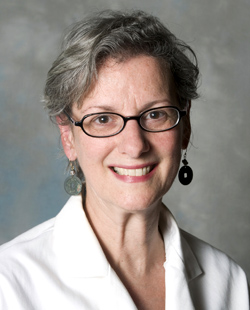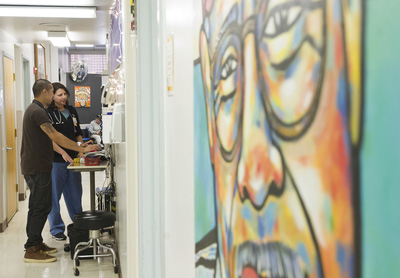
Pioneer Square Clinic brings hope and healing to homeless patients
Every day, Harborview's Pioneer Square Clinic confronts the explosive growth and changing needs of Seattle's homeless population. With three major shelters and one day center nearby, the clinic had 12,000 patient visits in 2016. In addition to primary and acute care, its services include pharmacy, psychiatry, social work, podiatry, nutrition and diabetes care.
People living in shelters and on the streets are three to four times more likely to suffer premature death than people who are housed.

They also have a higher incidence of hospitalization than the general public with longer inpatient stays. At the same time, access to care is a challenge due to the daily challenges of finding shelter, relying on public transportation to get to appointments and accommodating the fixed schedules of hygiene centers and meal programs.
Since its opening in 1971, the Pioneer Square Clinic has been a leader in developing innovative programs to address these challenges. In addition to clinic visits, providers and staff go to the sites where their patients seek housing and other social services. They provide shelter-based nursing and mental healthcare at the Downtown Emergency Service Center, Third Avenue Center and 1811 Eastlake Project; respite care at the Edward Thomas House; high utilization services for the King County Jail; and, as featured in a national media story, the only mobile palliative care program in the country.
Perhaps no one understands the changing needs of this community better than Nancy Sugg, who began her career as a UW Medicine intern in 1981 with rotations at the Pioneer Square Clinic and who has served as medical director of the clinic and downtown homeless programs since 1991.
In recent years, she notes, patients are living longer and need care for comorbidities such as chronic heart failure, COPD and diabetes. Many also have cognitive difficulties due to traumatic brain injuries, substance abuse and strokes.
As part of our community's safety net, the clinic accomplishes much of its work through partnerships with Public Health - Seattle & King County and the King County Health Care for the Homeless Network. Funding comes from both Harborview and external grants. During the past four years, the expansion of Medicaid under the Affordable Care Act has been beneficial with the number of uninsured patients decreasing from about 50 percent to 25 percent.
The Pioneer Square Clinic offers a three-year residency training experience in internal medicine, which always has intense competition for its nine slots. Many of the residents trained at the clinic go on to careers in global health, public health or medical care of underserved populations.
(Originally published in UW Medicine Insight, June 1, 2017